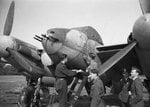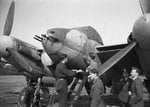Maestro
Master Sergeant
No plane is perfect.
Examples :
- The Spitfire (in my mind) was the best dogfighter, but it didn't had the range to escort bombers to Berlin and back.
- The P-51 was also a good dogfighter (in my mind, not as good as the Spitfire) but it got the range to escort bombers to Berlin and back. However, in spite of the numerous tries the US Navy did, the P-51 couldn't land on a carrier (that's why they bought some Seafires).
I won't argue that the P-51 is better than the P-38, because I prefer the P-51 to the P-38 anyway.
Examples :
- The Spitfire (in my mind) was the best dogfighter, but it didn't had the range to escort bombers to Berlin and back.
- The P-51 was also a good dogfighter (in my mind, not as good as the Spitfire) but it got the range to escort bombers to Berlin and back. However, in spite of the numerous tries the US Navy did, the P-51 couldn't land on a carrier (that's why they bought some Seafires).
I won't argue that the P-51 is better than the P-38, because I prefer the P-51 to the P-38 anyway.


